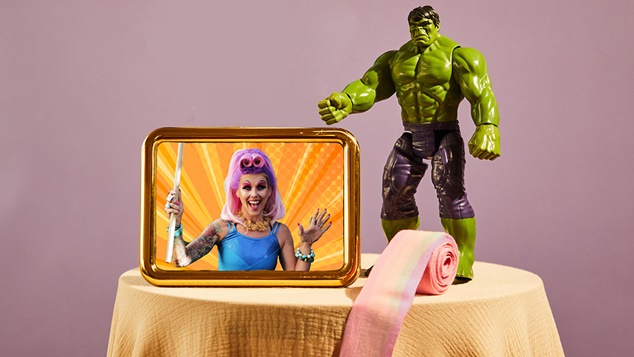
Queer as Flux opens at The Blue Room this week. Writer and performer Stace Callaghan recently spoke to Leigh Andrew Hill on the RTRFM program All Things Queer.
The autobiographical show explores what its like to live in a body that doesn’t match who you are. It’s described as a work that pays homage to queer ancestors who paved the way and not-so-queer folks who did their best.
I understand the main characters are a grown up tomboy and a drag queen fairy godmother, so it certainly lives up to its name, can you give us a brief rundown of Queer as Flux?
The show is my fourth autobiographical solo show and I have continued to explore gender in each of the shows.
It’s obviously been something personal to me as well, and in the show I go through different ages of my own personal story, but I’m guided by an alter-ego drag queen fairy godmother named Polly Tickle.
She’s very much about educating Stace around queer history, and guiding the Stace character – who’s name changes over time as well – through different pivotal moments or transitioning moments in their life.
I understand at the heart of the show is the concept of transitioning, but the context is broader than trans and gender diverse folks and bodies, what are you exploring here when you talk about transition?
My whole kind of premise is that transitioning is universal, everybody’s doing it, from babies to drag queens to ageing parents within the story.
I talk about my own mother’s transition into dementia, my father’s transition into being her care-giver.
I look at dying, near death experiences, interspecies, the environment in terms of how our climate is transitioning and what’s happening anatomically even to different animals because of what we’re doing.
Everybody transitions in lots of different ways, so let’s not think that gender transitioning is this weird or strange thing in terms of a mainstream kind of way of perceiving it.
Queer as Flux takes a look at queer history and not-so-queer people who also made the history books, how does that play into the story?
Well the not-so-queer people in the story are my actual living parents, definately no-so-queer. In Polly’s storytelling she’s looking at key historical moments where there was a transition or change in what happened, or someone trying to block that as well.
She’s very much a time travelling drag queen, so she’s been throughout time and space and witnessed different things that have happened politically, and so her story is very much about inserting herself in different political moments and teaching Stace about what’s important and we need to treasure our ‘trans-cestors’.
You portray multiple characters in this production, so how do you prepare for such an eclectic performance?
I think it’s very beneficial, and I’m not saying this in a joking way, but I have ADHD. So I can very quickly change from one thing to another – change my focus.
Partly it’s easy because it’s my life story, in terms of the Stace character’s changes, and Polly – she’s just a fabulous character. I quite enjoy her, I like playing her more than I do Stace.
Something happens physically in my body, I think to just snap into another persona each time.
It’s just another form of transition, as you say transitions are everywhere.
You literally watch the actor, who is me, transition from a boy, to a seven year old, to a fourteen year old, you’re watching a person before your very eyes transition.
As you said, this is your fourth autobiographical show, what does it mean to you to be sharing these personal and queer stories with the world?
Growing up there wasn’t any representation of me. I didn’t see myself on stage. I didn’t see myself in books or on TV shows or in movies.
So it feels like it’s a really important addition to what’s out there now in terms of seeing our own lives reflected back to us. That was the biggest response from the Brisbane season, as people went; ‘I finally see my story on stage’.
While I don’t seek to represent anyone else, or tell anyone else’s story, I think there’s enough in it that I think if you are queer or trans, or if you have older parents who ageing, if you have parents with dementia, if you have a dog, if you’ve ever been out at sea with whales – there’s something for everybody with this show.
It’s the opportunity to really to tell a very queer story, a very trans kind of story, in a really life affirming way, because for me a lot of things that I have seen, or did see, it was not life affirming. There was always a tragic ending, and I’m not interested in the tragic ending.
Queer as Flux is playing at the Blue Room from 26 October – 13 November. Tickets are on sale now.
OIP Staff
You can support our work by subscribing to our Patreon
or contributing to our GoFundMe campaign.






